Industry players in the agricultural sector have called on farmers to take advantage of dry season farming as part of conscious attempts to prevent the food crises projected to bedevil Nigeria in 2023.

They said the call is based on their belief that dry season farming is less ecologically risky and more enhancing in terms of productivity.
“Dry season farming in Nigeria is a superlative way of averting the food crisis that is already upon us,” says Sulaimonn Arigbabu, Executive Secretary, at the Human & Environmental Developmental Agenda (HEDA) Resource Centre.
Making the statement during a one-day sensitisation workshop on the benefits of Climate Information Service Delivery for Dry Season Farming organised by his establishment in collaboration with the Nigerian Metrological Agency (NiMet) in Abuja, Arigbabu lamented that farmers had failed severally to take advantage of NiMet’s seasonal predictions over time.
With a focus on “Averting a National Food Crises Post 2022 Flooding,” Arigbuba attributed this problem to the widening gap in food shortage and incessant price increment across the country.
Consequently, he wants to see more action at the state and local government level to enable farmers to make a favorable decision on when best to embark on planting exercise.
The HEDA’s helmsman also urged the various relevant government agencies including research institutes to deploy their full potential and capacity to reach out to farmers on how to leverage and profit from this available information.
He tasked NiMet to work closely with these research institutions to be able to provide farmers with the required climate information they need to foster food production in the country.
Furthermore, he expressed confidence that technology can be deployed as a powerful tool to decipher and reverse this impending calamity.
“Our telephone can do more for us than we are using it for, and the media can also help to get farmers prepared for the next planting season so that we can avoid the kind of disaster that we saw in 2022,” Arigbuba submitted.
On his part, the Director General of NiMet, Prof. Mansur Matazu, canvassed for the inclusion of young people as one of the rapid ways of boosting production and curbing the food predicament across the nation.
Represented by his Executive Assistance on Agricultural Metrology, James Adamu, Matazu underscored that Nigeria can avoid this unappealing situation if farmers are provided with the right information and infrastructure required to practice dry season farming.
This is because dry season farming, according to him, seems to be more productive and less exposed to environmental hazards when compared to rainy season farming.
“So, if people that have been affected are encouraged to go into dry season farming, you will find out that the effect on livelihood, food, and nutrition insecurity in the country will be reduced,” Prof. Matazu asserts.
Therefore, the NiMet boss pledged his agency’s commitment to continually provide the country with early seasonal climate prediction to enable farmers better prepare for their activities and avert a repeat of the flood devastation that negatively impacted food production in the country.
By Etta Michael Bisong, Abuja
